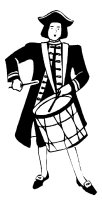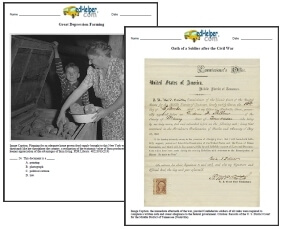
Worksheets and No Prep Teaching Resources
Reading Comprehension Worksheets
Colonial America (1492-1776)

Colonial America (1492-1776)
 Worksheets and No Prep Teaching Resources Reading Comprehension Worksheets Colonial America (1492-1776) |
 Colonial America (1492-1776) |
| edHelper's suggested reading level: | grades 6 to 8 | |
| Flesch-Kincaid grade level: | 7.63 |
|
Music and Dance
By Sharon Fabian |

|
 1 The colonists didn't have much time for fun. They were spending their time building their own houses and finding their own food. In fact, the colonists had to do everything for themselves. They were constantly busy, but everyone needs a break now and then. When the colonists were ready to take a break, they had to provide their own fun, too.
1 The colonists didn't have much time for fun. They were spending their time building their own houses and finding their own food. In fact, the colonists had to do everything for themselves. They were constantly busy, but everyone needs a break now and then. When the colonists were ready to take a break, they had to provide their own fun, too. |
Create Weekly Reading Books
Prepare for an entire week at once! |
| Leave your feedback on Music and Dance (use this link if you found an error in the story) |
 |
Colonial America (1492-1776)
|
 |
United States
|
|
|
 | Fifty States Theme Unit |
 |
Document Based Activities |